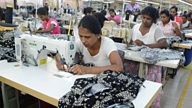{UAH} What impact is automation having on low-wage economies in Asia and Africa
Frank Mujab/Anneti.
-- Tune in to the programme below that was broadcast on the BBC World Service this morning. It makes very sober listening especially for people like you who are interested in globalisation. Automation is a looming disaster for the Asian economies. Bangla Desh, 80% of whose economy is based on textile manufacturing is bound to be hit hardest- with its textile industry- which currently relies on manual labour- wiped out within a matter of years- plunging nearly 10 million people jobless. This is because of the discovery of a new robot that can now cut and sew clothes. The textile industry is the only one that does not use robots- unlike car and almost all forms of industrial manufacturing- because clothes are too soft for robots to work on- but now they have discovered a way around this problem using some synthetic material which makes a cloth material as hard as a metal and therefore easy for robots to cut and sew. there will therefore be no need for those long lines of female garment workers you see in a Bangla Desh textile factory- and no need for tailors as well as robots will do all these jobs at a fraction of the cost. It is the same with the IT industry in India- which is going to loose almost 4 million jobs in the next few years because much of IT work- the writing, programming etc- is now being taken over by robots. The programme suggests much of the outsourced industries that were moved from America and Europe to Asia because of cheap labour will soon move back to their parent countries because automation will replace cheap labour. Even Call centres that India and the Philippines provide for much of Europe and America will soon move back because of the deveopments in Cloud IT technology, which will enable computers to do what call centres currently do.
A professor of Economics says in the programme this need not mean doom for Africann economies. Professor Lorenzo argues that automation will work to the advantage of small and medium scale industries, and this is where Africa has a comparative advantage. He says Africa must never try to follow the China example, because the massive advance in technology means the China experience will never be repeated again- ie building a modern economy on cheap labour. He argues the future of Africa is really in modernisation of its small and medium scale industries and PROTECTING THEM FROM GLOBAL COMPANIES.
I had never thought very seriously about the impact of new technology on African development- this programme was an eye opener-. But do our leaders listen to such programmes? In Uganda, Rwandan outlaw Kayibanda Museveni is still carrying a jerrycan at the back of a bicycle as a way forward for Ugandan peasants, while the rest of the world is battling with automation and how their economies can take advantage on this new scientific revolution that is unfolding before our very eyes.
Bobby
08:30Local time
08:32Local time
Disclaimer:Everyone posting to this Forum bears the sole responsibility for any legal consequences of his or her postings, and hence statements and facts must be presented responsibly. Your continued membership signifies that you agree to this disclaimer and pledge to abide by our Rules and Guidelines.To unsubscribe from this group, send email to: ugandans-at-heart+unsubscribe@googlegroups.com









0 comments:
Post a Comment